Kyle Dubas joined Prime Time Sports on Tuesday evening, discussing the William Nylander contract situation, the upcoming roster decisions ahead of October 3rd, and much more.
The full transcript is below. Some passages have been reorganized for readability purposes.
Kyle Dubas on Nylander contract negotiations: “A bridge for both of us would probably be the sub-optimal solution to this”

How much time during every day do you spend on the Nylander signing?
Dubas: It’s prominent in everybody’s mind right now. Our team has been up and rolling for nearly two weeks, and obviously, William has been a key part of the team for the past two seasons. Now he’s not here because we have not been able to come to terms on an agreement for him to play. I think we owe it to our program and we owe it to him — for what he has done for our team — to continue to stay focused on it and continue to work with Lewis Gross, his representative, and continue to work towards an agreement.
That is where we spend a good chunk of our time. We have Brandon Pridham and Laurence Gilman in our office who have tremendous experience on those matters. A lot of the preparation and planning — I allow them to do a lot of that work, and we discuss it throughout the day and we have continued discussions with Lewis. We are trying to facilitate something that can be fair to William in the short and long-term and to our program. That is where we are focused on right now and we continue to try to maneuver and get that done.
Is there a point person in your office in terms of discussing that with his agent? Or are all three of you on a conference with the agent and the agent’s reps?
Dubas: It has mostly been Brandon Pridham and myself. Lewis and I, especially in the last number of weeks as the calendar crossed to September, have had a lot of discussions just one-on-one. Brandon and he continue to stay in touch and we continue to work away at it. He has people at his office and on his staff that have also jumped in from time to time. It is at the stage now where I think continued dialogue is important and one-on-one dialogue is important.
There are obviously dates in the NHL calendar where a player must be signed. Is there a date for you where you would be concerned if he is not signed by?
Dubas: The obvious date would be December 1st because if he’s not signed by December 1st, he’s ineligible to play for the season. That is kind of the dire, distant date.
I’ve stated continually and will continue to state that William is a very key member of our program. We want him here for the long term. We think he can continue to help our program grow and develop and maximize his potential. We think we can continue to help him maximize his own potential. That is what we continue to work towards daily.
Obviously, our goal is to have it done as soon as possible. These are difficult ones, especially with a player of his magnitude and some of the more unique parts of his situation. It has taken some time. Unfortunately, we are at this point, but we continue to work towards it. Lewis Gross has been excellent and William has been excellent in understanding. And we try to understand where they are coming from as well. We continue to work away at it and we hope sooner than later we will come to an agreement.
When you got Tavares on his $11 million deal, we talked to you and you said that you still had confidence that you could sign Matthews, Marner, and Nylander. Do you feel still confident that you can do all three of those? Do you have enough of a sense of what it is going to cost you for Marner and Matthews?
Dubas: Yes. We’ve had discussions with all of their people as well, and those are ongoing, whether it’s Judd Moldaver with Auston Matthews or Darren Ferris with Mitch Marner. Those discussions are ongoing and they will continue to be ongoing. Using the same logic as with William, they are obviously very important players to our program.
But before we even looked at John and went to present to him in Los Angeles in late June, we had to be able to go and talk to John. He didn’t want to go into a spot — as he said a number of times since — and be subtracting from that spot to make it work. We spent a lot of time going through and saying, “Okay, here is what we’ve read and heard John is going come in at,” and you see various different comparable players. You get a sense of that, and then you kind of build out the rest of your group and see where it all fits.
You’ve got your internal calculations of what is going to happen on the business side; the salary cap has gone up every year, so you can’t bet on it or be sure, but if you think probabilistically it is going to go up [by a certain amount], and you be conservative and see how it all fits…
We did a lot of work — Brandon Pridham led the charge in our office — on that. I am still confident in it. I also understand that these things are not always simple and they take time and patience on all ends. That’s what we are doing.
Based on the fact that there is clearly a difference of opinion between you and the Nylander camp, is a bridge the only way you can get this done?
Dubas: I don’t think so. I think that that has been what a lot of people have been intimating — that that’s the only way it does get done. I think their camp has been focused on a long-term deal and ours as well. I think a bridge for both of us would probably be the sub-optimal solution to this. We continue to work primarily on long-term deals with Lewis, and he has been excellent in getting back to us and sharing his philosophy and how he does it.
That is really our goal. Our goal is to keep this group together as long as we can and sustain this thing moving out and allow this group the best chance to contend year in and year out.
Do you feel like you’re making progress on the deal? Or do you feel that you were looking for something but haven’t found it yet?
Dubas: I think we feel like we are coming together. The timing of it — obviously, there isn’t a formal deadline, but I think any player and anyone on the team side wants to have the best lineup for the season opener. Every player wants to be there for the season opener. I think as those things have come into focus, we have continued to work with them. I do feel like we are making progress and Lewis Gross has been excellent on their end in continuing to stay in touch and work with us on that.
I do feel like we are making progress. I know clearly where William stands and I think we have conveyed to them where we stand on it in terms of his importance to us. And I know how he feels about Toronto and our program. I am confident. I am optimistic. It just may not meet the timeline that everyone wants.
If you’re another General Manager out there going, “They can’t sign him to a contract and maybe they want a bridge deal, and I could give him a long term deal”… Have you had any calls?
Dubas: I wouldn’t be doing my job if I wasn’t accepting calls from teams, but I can say absolutely that we are not shopping him. I think the teams that have called us have more wanted to say, “Hey, how’s it going? If it ever gets to that point that it’s not going to work out, then let us know.” But it is not even close to that, and it won’t be. We will be able to find a way through it.
Is he working out? He must be.
Dubas: If you’ve seen him, I think he works out regularly, yeah.
He is skating and doing everything? You don’t think there is going to be a big lag if you don’t sign him before the season starts?
Dubas: I think that is a natural thing to think. If you weren’t prepared for the show and you came in… I think you’d like, of course, for everyone to be here for the start of training camp. These are the circumstances as they are. Our goal, once it gets done, is to get William up to speed as quickly as possible, understanding there will be some patience involved, and we’ll roll from there.
Dubas on consensus-building on roster decisions
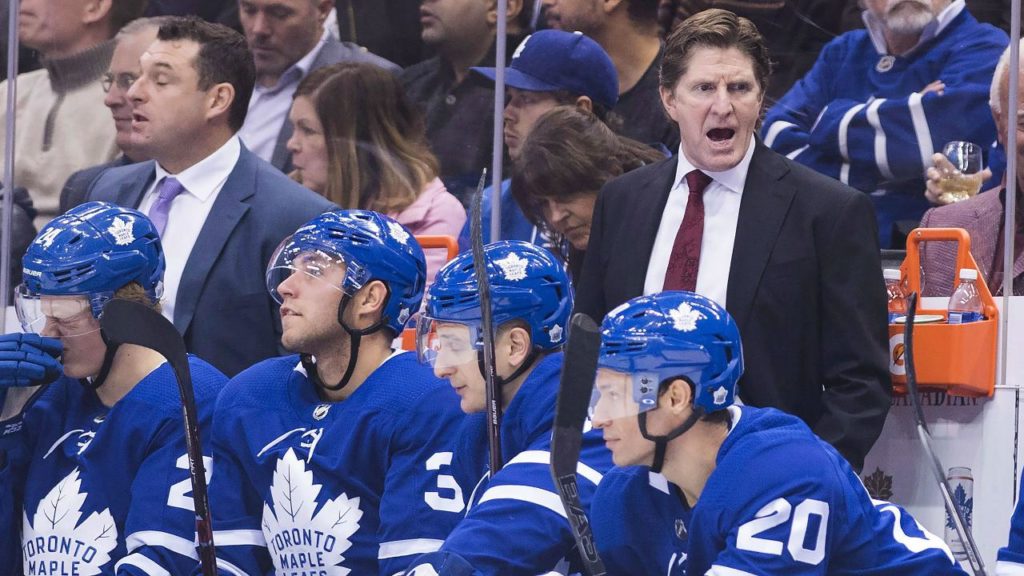
Who makes the call on roster composition between you and the coach, and why?
Dubas: In every organization, if you want to be successful, you have to have a collaboration. Right from the beginning — from the middle of May — Mike and I have talked every day. We know what the different decisions we have to make on the roster are, and then we take our input. Mike will talk to his assistant coaches, and then I’ll talk to our player personnel department and our Assistant General Managers of the team — Brandon Pridham and Laurence Gilman — and then I’ll get all their input and get all the input from Mike and his staff. In the end, I have to make the call. I think being collaborative is best, but in the end, I am the one that is tasked with making the decision and I’ll do so with all of the knowledge from all of the people within the organization.
You’re sort of consensus building, but at the end of the day, there has to be one person who makes that decision. Has that been a process for you to understand that it is now you making the decision?
Dubas: I think I have been fortunate to be able to come into this job having had to serve in that role previously, with our player development system with the Marlies, and in my time with the Leafs, and going back to junior hockey with the Soo. I get that the stakes are bigger here and the team is of far greater importance and prominence to the community, but those different experiences have served me well in building the process that I want in terms of how I am going to go about making those decisions. Some people are going to like those decisions and some people aren’t, but I want everyone in the organization to know what decisions we are making and that their opinion is important to me. Subsequently, I am going to have to make it and it may not always be what they want, but I am going to go through a process of taking their information into my scope and then proceeding from there.
When a player is acquired, it becomes a coach’s responsibility to determine how much he plays, more or less. But who stays on the roster — who makes the team and who doesn’t make the team — is that the coach’s responsibility? Is that something you work as a team together on? What happens if your opinion is A and his opinion is B? Because Mike isn’t exactly democratic.
Dubas: It is black and white with Mike, and you know where he stands. We’ve had a number of discussions right from the beginning about where the different trigger points are going to be on our roster, what the key decisions are that we are going to have to make. We’ve gone through the whole summer discussing those daily and having those discussions daily. In the end, when it comes to next Tuesday and we have to set our roster, I am going to have to be the one who sends it in and makes the decision. Once the players are on the roster, the deployment of the players and how they are played, what special team they are on, and what line they’re on — that is Mike’s.
Just as I take his opinion when it comes to player acquisition and roster building, we sit and talk about all of that stuff as well. But in the end, it is his lineup card, as they say. He has to put the team onto the ice that he thinks is going to give us the best chance to win. On both sides of it, we are discussing it, and I think we respect each other’s decision-making processes on both ends — deployment on one end, which is the coach, and roster building, which would fall to me.
Dubas on the idea of carrying three goaltenders: “I don’t think it’s optimal for the two backups”
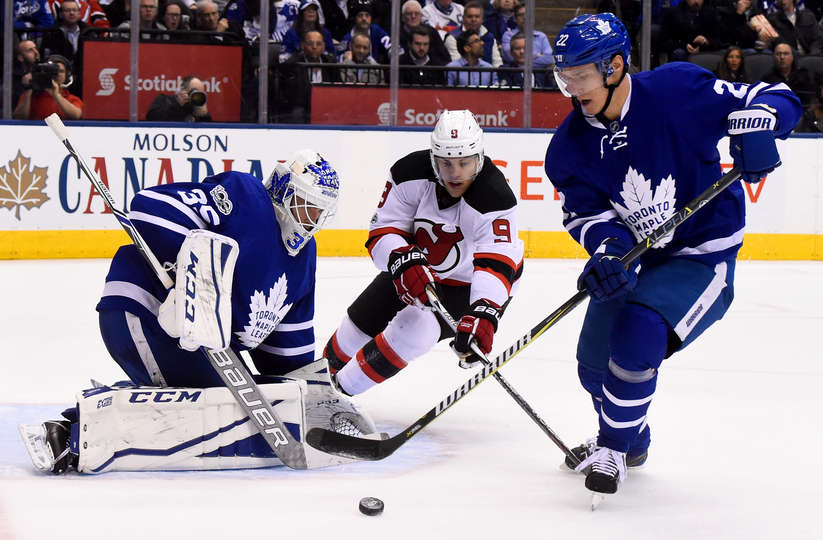
We’ve talked a lot about the Sparks-McElhinney battle for the backup spot. Does it come down to the way they play in preseason, or does it come down to one is a 25-year-old with limited NHL experience and one is a 35-year-old who played lights-out as a backup last year? Are you concerned about 10 years from now, or are you concerned about now?
Dubas: I think it’s my job to be concerned about both. When it comes to those two goalies, we have a larger body of work to consider for each.
Curtis, we picked up two seasons ago in the middle of the year, and he has been an excellent goaltender when called upon and an excellent support to Freddy. He has played well for us ever since coming over. He is a very, very solid person in the locker room. He is a very good goaltender to have around.
Garret is ten years younger, has been with our organization for a long time, and last year led the Marlies to the Calder Cup and won American league goaltender of the year. I am not going to get too caught up in the previous week or previous game, though it does add to the sample and add to the decision-making process. I think we have to do what is best for the team in short and long-term and evaluate the prospects of each goalie to fulfill each of those.
There is a third option and that is to keep all three. Philosophically, how would you feel about that approach — at least at the start of the season, to keep all three?
Dubas: I don’t think it’s optimal for the two of them. Frederik Andersen is going to have his net in practice. We know where he stands as it pertains to opening night and the like. But for the other two, if you are in a goaltending tandem and then you make that a trio, the two goalies who are deemed the backup often split the net, split the shots in practice, split the development time, and split the attention of the goaltending coach. It is certainly not optimal. It is an option that we can certainly look at, but we still have a week from today to sort through and figure out what is best for us. That decision is ongoing.
One of the real issues that you and Mike are going to have is figuring out your six or seven defensemen will be. The top four is pretty much figured out. The next two? You’ve got a boatload of guys. Has anyone jumped out to you as winning a job?
Dubas: With our defense, it is certainly a question that people bring up all the time and I always was more bullish about it because I’d watched a lot of these players that weren’t household names or had played for the Marlies. We knew they were on their way. Now that they are here and you see a Travis Dermott — he’s been injured, but we know he is good. Igor Ozhiganov comes over and he has played very well for the first stretch. Justin Holl has played well. Marincin has played well. Calle Rosen has played excellent. You’ve got Connor Carrick in the mix.
I think we’ve got three more games here. You’re not going to base it all on how they play in these three games, but they are going to help us make our decision for who stays and who goes. When it comes to the seventh guy, if he is not waiver eligible, then you can have him go and play with the Marlies. And then we’ll see how guys make their way through the season and we can always make a change then.
Dubas on the captaincy: “Being the captain of the Toronto Maple Leafs is different than it may be in other markets”
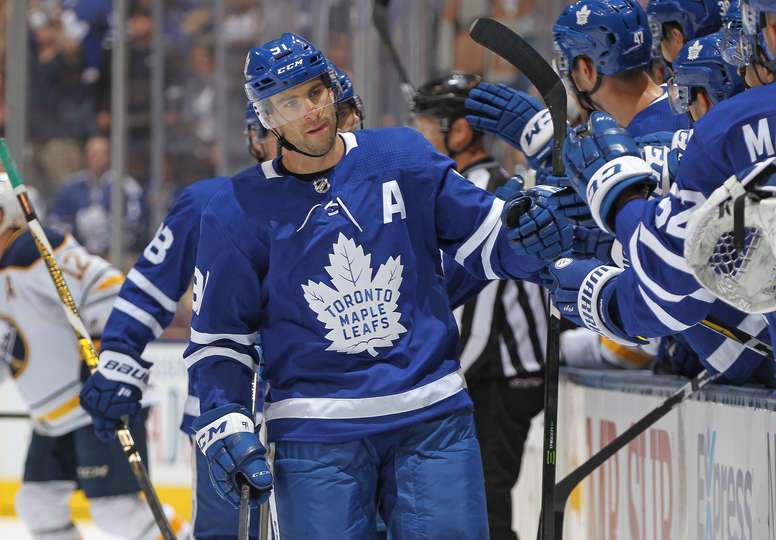
Do you believe in the captaincy? There was a time when captains were really important. They were the only guys on the ice who could talk to the referee, whatever that means. They were generally voted on by the players in the room. This perception of the importance of the captain has prevailed through an era where the role of the captain isn’t what it was. It is almost symbolic now. Do you have a philosophy on the captaincy?
Dubas: I do think it is very important. The importance of being the captain of the Toronto Maple Leafs, I think, is different than it may be in other markets. Being the captain of the Toronto Maple Leafs in Toronto, I think, is different than being a captain in a smaller market or of a newer franchise. Not to say their role within the team is different as a captain, but your expectation with the media and in the community is different.
We have talked about it a lot because it is a topic that has been brought up a lot over the course of the last few years. The way that we have elected to handle it is to go ahead with patience and see [what happens] as our group has been actually together. We have added John to the mix and he has been a captain for the last five years with the Islanders, plus we have Patrick Marleau, who was previously a captain with San Jose. And then we have an excellent group of leaders and young leaders coming up behind them.
I think the way we have look at it is that we want to be patient because it is quite the honour here. If you look at the Yankees and the Red Sox, they have captains from time to time, but they don’t always have captains. You’ve got Jason Varitek and Derek Jeter, and subsequently, there hasn’t been — I don’t think; I could be wrong — a captain of those franchises. I think that is the way we look at it here in Toronto.
I know it doesn’t necessarily always pacify the demand that we have for a captain, but I think we’ve got a great group of leaders. When the time comes and a player asserts himself as a captain of the group, we will make that decision then rather than hastily doing it now and then having to go through a whole process of regretting it.
It’s not obvious right now who that guy is. Until Tavares arrived, Matthews looked destined to be the captain. Now, all of a sudden, there is John Tavares. “If I name Matthews, does that make Tavares angry, or the other way around?” You’re playing the cards close to the vest here. What do you think?
Dubas: I think with leaders of that calibre — whether they are leaders now or think they can develop into leaders — they haven’t been together on a team. It’s hard to tell what the interaction is going to be. We think it is going to be great and it has been great so far, but until you go into a season and have the ups and downs…
Right now, everything is great. As the season goes on, you’re going to have stretches where you don’t play well and guys go into slumps — various things that happen to sports teams in any given season. People say it is adversity; I just think it is part of being a sports team that you are not going to play great all year. Seeing what happens at those moments that will be a key indicator for us as to who the captain will be. Seeing them go through it together, I think, is the important part.
Dubas on learning on the job, analytics, diverse hires
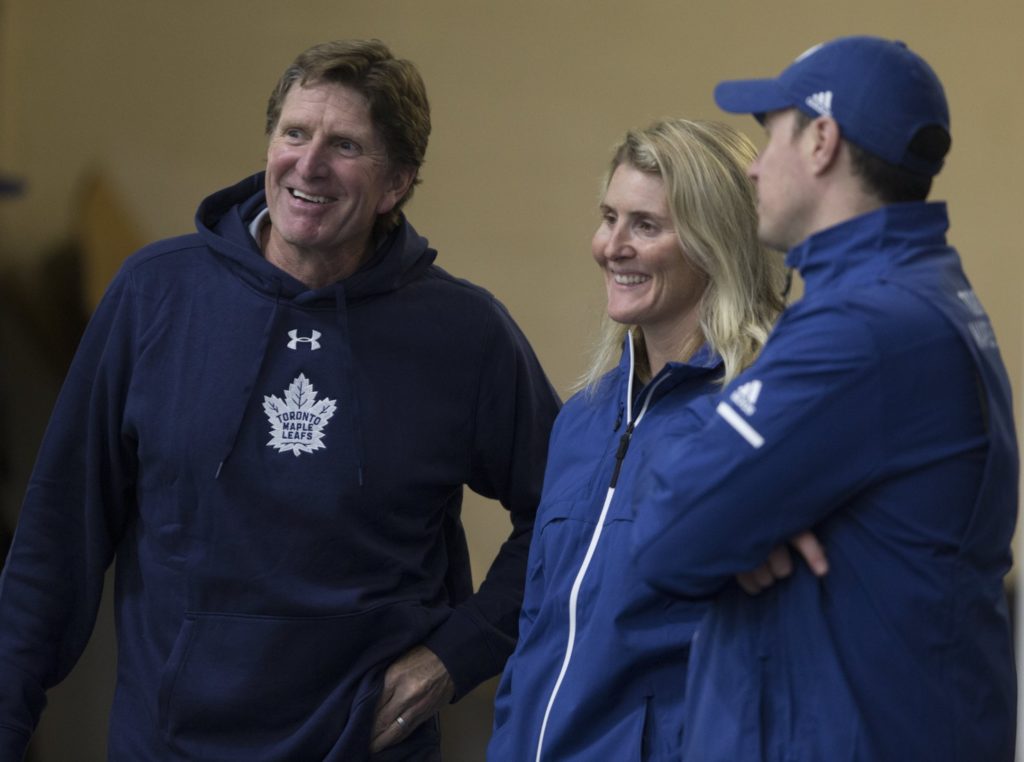
You are a sports executive who is sort of at the forefront of the statistical revolution and statistical analysis. You embraced it. You are someone who is connected to it. The NHL statistical revolution is pretty much well known in terms of what is publicly accessible in terms of stats — Corsi, Fenwick per 60. Does your analytics department have stats that are sort of proprietary to the Leafs, and how much do you rely on them on any given day or week? It is just sort of a fascinating world just to see what we now have publicly available in hockey versus 10 years ago. Guys like you in these different departments — you probably have stuff that we don’t even see.
Dubas: I would hope so because I think we have a great staff on our research and development side. Darryl Metcalf leads that staff and they are a part of every decision that we make — the various different things that we track internally that are not public are a part of every decision we make on the personnel side and they enter into a number of other facets in our organization as well in terms of the draft or things that Mike wants or Mike requests from his staff from the R&D department.
That has only evolved. And on the player development side as well with different things that we track and monitor. It’s been a great process to see that area of our operation grow, led by Darryl. We are only continuing to try to push it and stay ahead and add any advantage we can to the organization. That has been a lot of fun to see that. We are fortunate to have the group that we have there on the R&D side.
Is there a publicly accessible stat that you particularly like?
Dubas: I think all of it — the publicly accessible ones — have proven their value over time. Now that the sample has grown to nine seasons of publicly accessible data, the ones that correlate to future success are well known. Without tipping my hand, I think most people in the hockey industry and particularly the analytics community — if you want to call it that — are aware of what those are.
You very clearly value outside-the-box thinking and outside-the-box hires. It’s kind of weird — people say Hailey Wickenheiser is an outside-the-box hire, but that is kind of ludicrous if you determine here as that given her hockey ability and her hockey genius. Masai Ujiri gave you advice that the best thing you can do is hire women because that is not traditionally been the thinking in the NHL. Can you recount that story? That was really interesting because Masai is onto something.
Dubas: Masai has gone forward with that publicly since. I just saw last week, as part of the Giants of Africa campaign, he was discussing the same principle.
I think we are just very fortunate to have Hailey. She is the greatest player in her sport. She has been the greatest women’s hockey player in the world. When you are the best at what you do as an athlete, there is a different level of thinking that happens. For her to be able to relate that to our players and prospects and player development, I think, is going to be a huge benefit to our program and specifically to the players who are in that vein. There is experience that her and Brendan have — him being a Hall of Fame player and she will be a Hall of Fame player as well in time — that I don’t have. I recognize that and I think we are trying to build our program to where our players have the most diverse offering that they can get in terms of their own development. I think that is the way to look at it.
As it pertains to diverse hires, I think the way we look at it is we want to have the best people that we can to fill the different roles in the organization or add to them. We are not going to, if they don’t check certain boxes, throw them outside and say no. We are going to hire the best people, period. That has really been the way that we have gone about it. We are not trying to be revolutionary in any way. We are just trying to build the best program that we can.
What have you learned the past few months? Are there some things that have actually happened that have surprised you?
Dubas: I think I was fortunate to have Lou as the GM before, where I took the job and learned a lot about what to expect when you are in that position and how to handle different things. But there is always different things — whether it’s staffing, decisions we have to make on different players, so on and so forth — that until you are actually there and are in charge of making those decisions — your relationship with everybody in the organization — it all changes when you are in the General Manager role. So it’s been about adapting to that, trying to maintain who I am and not really change the way I go about things, and trying to incorporate that into the NHL level.
Because you had a guy with so much experience as a mentor, were you in the room? Would he allow you to be in the room when he was talking to a player and negotiating a contract, and those kinds of things?
Dubas: There were some [times] with Lou where I was very fortunate — whether it was the agent or the player — where he would allow me to come in. There are times — and I’ve felt this as we’ve gone through our own experiences in the summer — where you have to go one-on-one with the agent. What I’ve learned from Lou, in those instances, is when is the right time to push the gas down on meeting with just with the agent, or the agent and the player, and so on and so forth. I learned that part as well rather than just being able to sit as a fly on the wall, which is very beneficial and has been beneficial as we’ve gone through the summer.


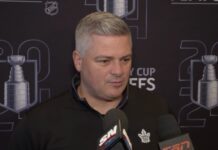

![Sheldon Keefe Post Game, Leafs 3 vs. Bruins 2: “I loved [the Matthews] line, and I loved a lot about our game all the way through the lineup” Sheldon Keefe, Toronto Maple Leafs post game](https://mapleleafshotstove.com/wp-content/uploads/2024/04/keefe-pg-game-1-218x150.jpg)
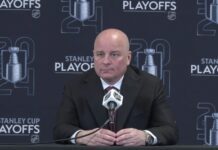



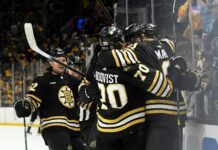















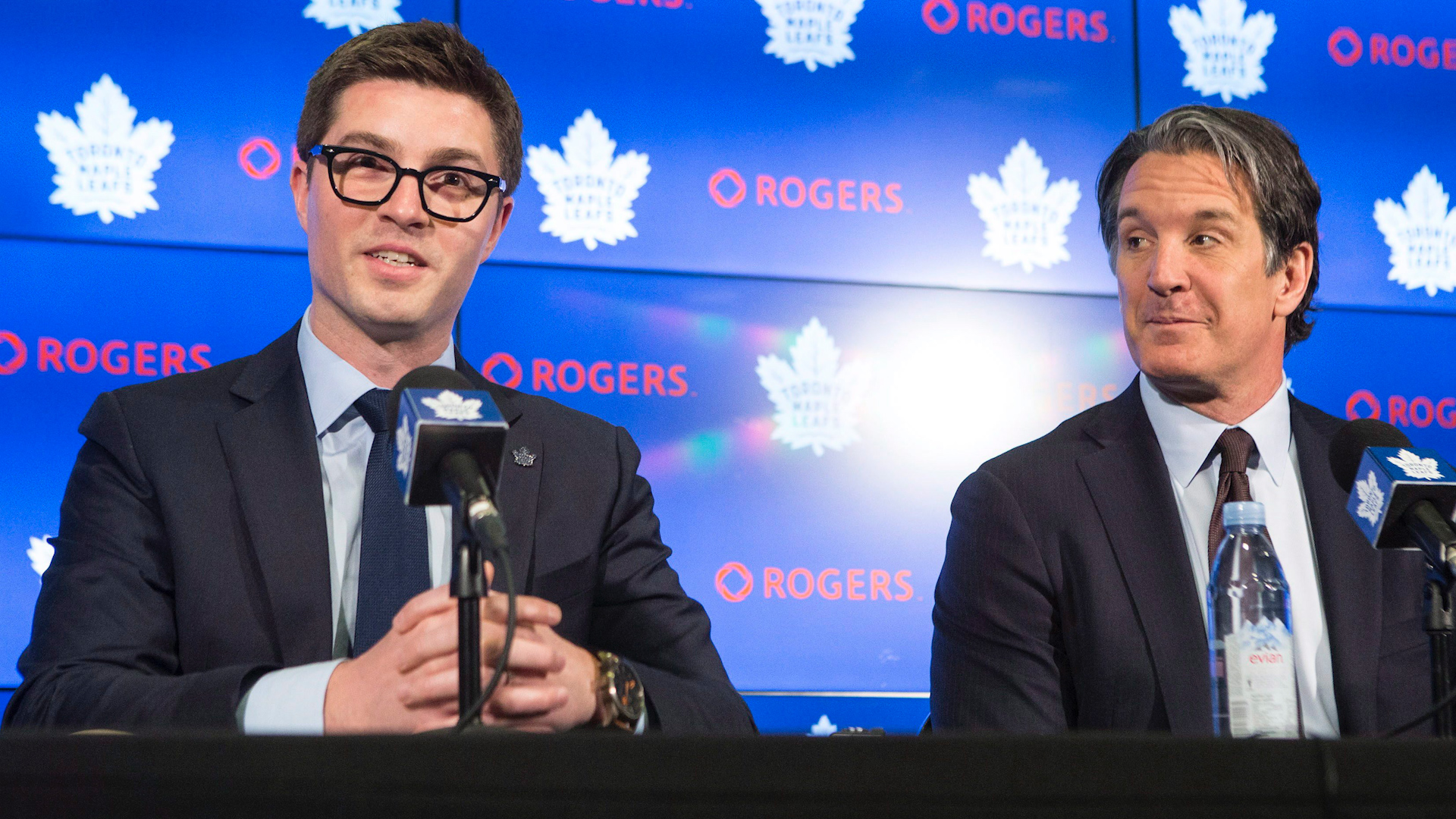
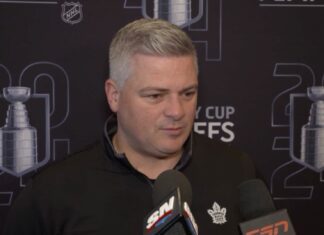




![Sheldon Keefe Post Game, Leafs 3 vs. Bruins 2: “I loved [the Matthews] line, and I loved a lot about our game all the way through the lineup” Sheldon Keefe, Toronto Maple Leafs post game](https://mapleleafshotstove.com/wp-content/uploads/2024/04/keefe-pg-game-1-100x70.jpg)



